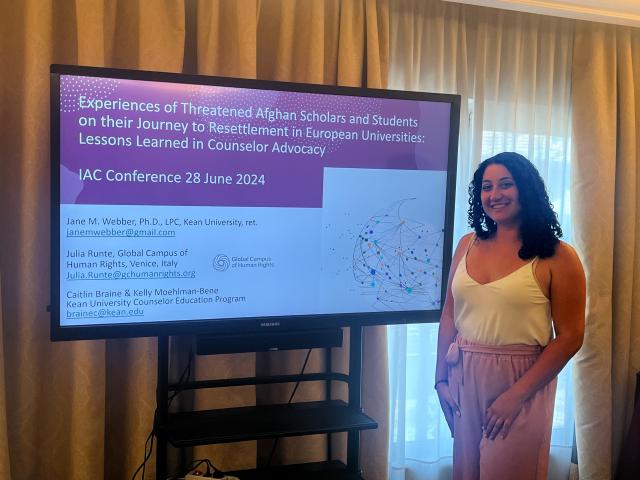Kean University Graduate Students Research Afghan Refugee Experience

Kean graduate student Caitlin Braine presents research at a conference in Italy. Student researcher Kelly Moehlman-Bene was unable to attend.
The work of two Kean University graduate students who researched first-hand experiences of Afghan refugees was showcased last month at an international counseling conference in Italy.
Kean counseling students Caitlin Braine and Kelly Moehlman-Bene worked with the Global Campus of Human Rights, studying personal accounts of 34 Afghan scholars and students who were resettled in Europe after being forced to flee the Taliban.
Their findings, presented to the International Association for Counseling conference, held in Naples, included analysis of ways that Afghan refugees could be assisted through counseling.
“The Afghans experienced immense trauma and worry about what was going to happen next. Everyone had fear for their safety, for their families,” said Braine, of Sayreville, who gave the presentation at the conference. Both she and Moehlman-Bene are pursuing master’s degrees in clinical mental health counseling.
Working with Kean Assistant Professor Jane Webber, Ph.D., who has since retired, the two students used written surveys and previously-recorded interviews to examine the experiences of the Afghans, who were resettled in countries within the European Union. Due to privacy concerns, names of the refugees were not used. Many refugees were accompanied by spouses and children.
Moehlman-Bene, of Randolph, who was unable to attend the conference, said the researchers looked for common themes in the interviews.
“We found what the refugees had in common through their experiences leaving Afghanistan, settling in a new country and continuing their studies,” she said. “Of course we also found experiences that differed.”
The students’ findings for counselors working with the Afghans include validating the refugees’ culture shock; recognizing multiple intersecting needs; and providing advocacy to help with tasks such as understanding a new country and registering children for school.
The project, formally titled Experience of Threatened Afghan Scholars and Students on Journey to Resettlement in European Universities: Lessons Learned in Counselor Advocacy, received a Kean Students Partnering with Faculty grant. The student research was also presented at Kean’s Research Days.
Rebekah Pender, Ph.D., director and clinical coordinator of Kean’s Counselor Education Department (CED), said conducting such research is important because of the Kean’s diversity and global reach, as well as the University’s status as the first urban research university in the state.
In addition, she noted the counseling community is international, and Kean’s CED trains students to work with populations from around the globe.
“It’s important for our students to understand the global impact of counseling and advocacy for those impacted by trauma, and the ways in which Kean, and the communities around Kean, can be supported through these efforts in international research,” she said.
Julia Runte is project officer for the Threatened Students and Scholars Program in the Global Campus of Human Rights, based in Venice. She said the impact of the research is two-fold.
“It works as a program evaluation for the project, and it gives ideas for counselors who work specifically with the Afghan diaspora,” she said. “It was a challenging experience because you hear their personal stories and trauma.”
Both students said taking part in the research was impactful for them as well.
Moehlman-Bene, who said her career goal is to counsel adults, wants to work with trauma survivors, including as a first responder providing “psychological first aid” after natural disasters, wars, mass shootings and other traumatic events.
“I am passionate about trauma work, fascinated by our body's way of keeping us alive through horrific events and how the body expresses all that mental and emotional turmoil,” she said. “I want to incorporate research into my counseling practice, more specifically, trauma research, and this project has been my initial push into that world.”
Braine, whose career goals include counseling individuals with developmental disabilities and entering academia, said she felt “humbled” by the experience.
“It was very humbling to hear someone tell their story- just having been forced to flee their country and leave behind their whole life, simply for who they were as a person,” she said. “It just made me feel very fortunate to have been born where I was born.